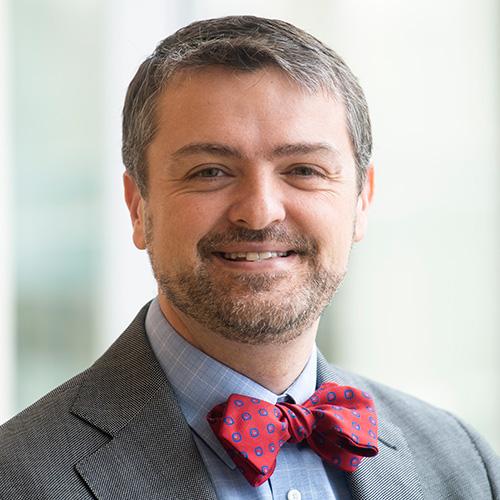 Eric Wallace, M.D.The Mary Heersink Institute for Global Health aims to improve health outcomes through a global telehealth initiative facilitated by UAB. In partner countries, some people die due to limited access to advanced medical information, expertise, and services that are routinely available in the U.S. The goal of the institute’s Global Telehealth Initiative is to improve health and save lives, using innovative strategies that ensure its sustainability and enhance access. The program aims to collaborate with partner health systems around the world while minimizing the burden on any single health system and enhancing efficiency and culturally appropriate care. Operational challenges such as medical liability, documentation, and longitudinal follow-up be addressed as part of this initiative. To accomplish these goals, both asynchronous and synchronous interactions will be used.
Eric Wallace, M.D.The Mary Heersink Institute for Global Health aims to improve health outcomes through a global telehealth initiative facilitated by UAB. In partner countries, some people die due to limited access to advanced medical information, expertise, and services that are routinely available in the U.S. The goal of the institute’s Global Telehealth Initiative is to improve health and save lives, using innovative strategies that ensure its sustainability and enhance access. The program aims to collaborate with partner health systems around the world while minimizing the burden on any single health system and enhancing efficiency and culturally appropriate care. Operational challenges such as medical liability, documentation, and longitudinal follow-up be addressed as part of this initiative. To accomplish these goals, both asynchronous and synchronous interactions will be used.
The initiative will be guided by the institute’s new associate director for Telehealth Initiatives, Eric Wallace, M.D., medical director for Telehealth at UAB Medicine. Wallace is a native of Alabama and attended both undergraduate and medical school at UAB. He completed his residency training at UAB as well, after which he served as chief medical resident. He then pursued a nephrology fellowship at Vanderbilt University and served as chief nephrology fellow. After his fellowship, Wallace joined the faculty at UAB.
“I've always been interested in global health and, growing up, wanted to be in Doctors Without Borders,” said Wallace. “My mother is an immigrant from Chile. Telehealth truly expands the definition of Doctors without Borders and allows for the inclusion of providers that, for family reasons or others, could never have before participated in global health.”
Since becoming faculty, Wallace’s research and practice have been focused on eliminating geographic and socioeconomic barriers which prevent patients from accessing specialized care. He has focused on telemedicine in the provision of care in home dialysis and rare diseases and is bringing his expertise to his new position with the institute.
“Dr. Wallace has been at the forefront of telehealth, leading its growth here at UAB and Alabama,” said the institute’s director and associate dean for Global and Women’s Health, Alan T. N. Tita, M.D., Ph.D. “I am excited to work with him, UAB stakeholders, and our global partners to leverage technology to develop and implement a sustainable, accessible, and quality global telehealth service.”
Wallace is focused on creating a global network and establishing processes by which physicians and affiliates at UAB and abroad can increase access to care for patients who may face travel-related issues. It is his hope that with these studies, the physician workforce distribution issues can be addressed, and access to care across the globe can be improved.
“Telehealth really allows health care workers to participate in the care of people worldwide,” said Wallace. “It can facilitate it in so many ways. Telehealth could be used to deliver care directly to patients. It can be used to educate providers in any country, thus establishing a local highly trained workforce. Finally, and just as importantly, as we open these avenues to participate on a global level, relationships are formed, teams are built, and we can start tackling problems together. We all become part of the same team instead of us and them.”
If you are interested in participating in a global telehealth initiative, please email the Mary Heersink Institute for Global Health. A pilot funding opportunity will soon be offered, drawing from guidance from the global telehealth task force.